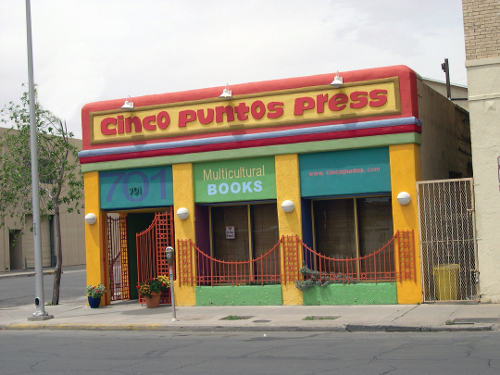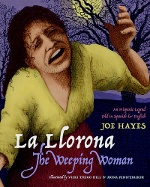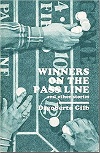Notes from Our Backyard
Let us begin by congratulating REFORMA and all the wonderful activist librarians who have made the Pura Belpré Award such a great success. Twenty-five years! They have fought for Latinx culture in its many forms and in doing so have brought us all abundant good. ¡Viva, REFORMA! ¡Viva, el premio Pura Belpré!

The Cinco Puntos Press office in El Paso.
Let us begin by congratulating REFORMA and all the wonderful activist librarians who have made the Pura Belpré Award such a great success. Twenty-five years! They have fought for Latinx culture in its many forms and in doing so have brought us all abundant good. ¡Viva, REFORMA! ¡Viva, el premio Pura Belpré!
***
For so long, the New York publishing industry and the Anglo-dominated library establishment did not recognize the importance of Latinx writers and illustrators. Maybe because they didn’t live in El Paso, Texas, on the U.S./Mexico border, as we do, they didn’t understand how Latinx families were hungry for books that represented their cultures and languages, the color of their skin. They hadn’t had their eyes opened to see the vast numbers of school kids who came from Spanish-speaking families, who only spoke Spanish — these kids needed books they wanted to read! Books that mirrored their lives.
Nor did the publishing industry/library establishment see in front of them the burgeoning Latinx middle class with money to spend on books: like the executive of a large Midwestern educational wholesaler in the 1980s, whose response to our urging to promote and sell bilingual books was: “But who are we going to sell them to? The workers in the warehouse?” This was the kind of ignorance and chauvinism that made Latinx librarians angry. Luckily for us, these librarians transformed that anger into positive action. In the 1970s, they organized REFORMA and pushed against the dominant culture until they created the Pura Belpré Award to recognize and promote Latinx writers and illustrators of children’s books.
In many ways, Cinco Puntos Press grew up alongside the Pura Belpré Award. When we started publishing in 1985, we didn’t know what we were doing other than being writers (Lee is a novelist, Bobby a poet) who wanted to be publishers. We wanted to make a living in literature, doing what we love. We found our first books to publish, as well as our roots, “in our backyard” — we live in central El Paso’s Five Points neighborhood, where we can sit on our front porch of a summer evening and see the lights of Juárez. We can walk to Mexico from our office. At that time, the border and its “Spanglish-speaking” inhabitants were the frontline of the American experience, and everything about this place captured our imaginations.

 Cinco Puntos’s first list in 1985 consisted of two titles: Dagoberto Gilb’s adult collection of short stories Winners on the Pass Line, about working-class Chicanos; and the bilingual now-classic children’s book La Llorona / The Weeping Woman by Joe Hayes. Both had been ignored by the mainstream publishing establishment. Dago’s collection was a winner in 1984 of California’s prestigious James Duval Phelan Award (for a literary work-in-progress), but to his dismay it did not get picked up by a NYC press. We loved Dago’s stories; publishing them was a no-brainer. Joe Hayes, like Cinco Puntos, is a product of the border, growing up poor in Benson, Arizona. He was a working storyteller, performing bilingually in schools in Arizona and New Mexico. The kids’ all-time favorite story was “La Llorona,” a Medea-like legend told as a cautionary tale that every Mexican American and Mexican child learned growing up. Joe said it needed to be the first book of his that we published, and he said it had to be bilingual, with an emphasis on Mexican Spanish. He knew his audience because he was in the classroom telling stories, and he knew what kids liked. And he was right! La Llorona is our all-time best seller. Librarians say that “she” leaves the library more than they do!
Cinco Puntos’s first list in 1985 consisted of two titles: Dagoberto Gilb’s adult collection of short stories Winners on the Pass Line, about working-class Chicanos; and the bilingual now-classic children’s book La Llorona / The Weeping Woman by Joe Hayes. Both had been ignored by the mainstream publishing establishment. Dago’s collection was a winner in 1984 of California’s prestigious James Duval Phelan Award (for a literary work-in-progress), but to his dismay it did not get picked up by a NYC press. We loved Dago’s stories; publishing them was a no-brainer. Joe Hayes, like Cinco Puntos, is a product of the border, growing up poor in Benson, Arizona. He was a working storyteller, performing bilingually in schools in Arizona and New Mexico. The kids’ all-time favorite story was “La Llorona,” a Medea-like legend told as a cautionary tale that every Mexican American and Mexican child learned growing up. Joe said it needed to be the first book of his that we published, and he said it had to be bilingual, with an emphasis on Mexican Spanish. He knew his audience because he was in the classroom telling stories, and he knew what kids liked. And he was right! La Llorona is our all-time best seller. Librarians say that “she” leaves the library more than they do!
Both Dagoberto and Joe took a big chance with a fledgling publisher like Cinco Puntos. Little did we know back then that these two books, each in its own way, would determine who we were to become.
***
In the 1980s and 1990s, classical Cuban Spanish was the preferred Spanish for translations in U.S. publishing, especially for children’s books. (This was natural because it represented the Cuban diaspora to Florida, New York City, and the rest of the East Coast.) And, for pedagogical reasons, so we were told, bilingual books were frowned upon. Publishers printed separate editions of books, one in English and one in Spanish, an expensive proposition. And children’s books leaned heavily on East Coast and European aesthetics. To appeal to Spanish speakers, big publishers took the easy route: they translated English classics such as “Little Red Riding Hood” into Spanish editions, illustrated by artists whose eyes hadn’t traveled through the Southwest and Mexico. Books from Latinx writers and illustrators had not yet entered the marketplace.
But we found our authors, our illustrators, and our books in the code-switching world of El Paso and similar communities that stretched along the border from Brownsville to San Ysidro, and in Mexican American barrios in Los Angeles, San Antonio, Albuquerque, and Tucson. In the beginning, these communities were also our audience and our market. Teachers and students wanted our bilingual books. They loved our authors: Benjamin Alire Sáenz, Joe Hayes, Rudolfo Anaya, Claudia Guadalupe Martinez, Isabel Quintero, Xavier Garza. And they loved our illustrators, whose aesthetics reflected the vibrant world of the border, artists like Francisco Delgado, Gloria Osuna Pérez, Geronimo Garcia, Gaspar Enriquez, and Antonio Castro L.
We were riding the wave of the Mexican diaspora. It wasn’t long before teachers, librarians, and readers were calling us from Connecticut, Oregon, Iowa, Minnesota — all those places where Mexican Americans were moving. They became our outreach.
***
Now the Mexican American and Mexican population in the United States is over forty-five million. This is larger than the population of Canada. That is no “niche market.”
Still, it has taken awhile for the border and its rasquache ways to catch hold. Our books didn’t quite appeal to the East Coast book and library media, nor to Midwestern wholesalers.
We kept knocking on doors, talking to librarians and book buyers, and going to book fairs, where our booths would be crowded with kids and parents speaking Spanish. We attended as many library conferences as we could — bilingual education associations (NABE, CABE, and TABE) and, of course, ALA and TLA. Thanks to REFORMA and regional librarians who bought and used our books, librarians from other parts of the country began paying attention to us. We have had six books on the Texas Bluebonnet Award Master List (Watch Out for Clever Women, Ghost Fever, They Call Me Güero, Grandpa’s Hal-la-Loo-Yah Hambone, Selavi: That Is Life, and Crossing Bok Chitto). In 2007, the schoolchildren of Texas selected Joe Hayes’s bilingual, bicultural middle-grade novel Ghost Fever / Mal de fantasma as the Bluebonnet winner. Ghost Fever was the first bilingual book to win the Bluebonnet! This was an unheard-of event back then, when the “English-only” movement spoke with a loud Texas twang.
The country was changing.
 In 2012, Xavier Garza’s Maximilian & the Mystery of the Guardian Angel, a Cinco Puntos title, was selected to be a Pura Belpré Honor Book. Luis Francisco Vargas, a young librarian from Long Beach, was on the Pura Belpré committee that year. He understood the appeal of Xavier’s book because the kids who came to his library loved lucha libre. When Francisco presented the award to Xavier, he put on his own lucha libre mask and talked about how some of his nonreaders started reading when they were drawn to Xavier’s bright and wild graphic illustrations. Francisco had to take his mask off, he was crying so much. We all cried, in fact!
In 2012, Xavier Garza’s Maximilian & the Mystery of the Guardian Angel, a Cinco Puntos title, was selected to be a Pura Belpré Honor Book. Luis Francisco Vargas, a young librarian from Long Beach, was on the Pura Belpré committee that year. He understood the appeal of Xavier’s book because the kids who came to his library loved lucha libre. When Francisco presented the award to Xavier, he put on his own lucha libre mask and talked about how some of his nonreaders started reading when they were drawn to Xavier’s bright and wild graphic illustrations. Francisco had to take his mask off, he was crying so much. We all cried, in fact!
We were so happy to be at the Pura Belpré Award Celebración. And to be invited to two more celebrations in subsequent years for They Call Me Güero and All Around Us. We were happy to be among all these great librarians who had pushed so very hard to open up the door for the recognition of Latinx authors and illustrators. These librarians have been on the frontlines of the #WeNeedDiverseBooks and #OwnVoices movements. El premio Pura Belpré has become a monument to their essential work, the work of librarians everywhere.
¡Viva, el premio Pura Belpré! Hats off to you all! ¡Mil gracias desde El Chuco!
From the May/June 2021 special issue of The Horn Book Magazine: The Pura Belpré Award at 25.

RELATED
ALREADY A SUBSCRIBER? LOG IN
We are currently offering this content for free. Sign up now to activate your personal profile, where you can save articles for future viewing.







Add Comment :-
Comment Policy:
Comment should not be empty !!!
Sally Andrade
Those of us in El Paso are SO proud of Cinco Puntos Press and it’s beautiful books. Viva la magnífica Lee Byrd! Viva el poeta Bobby Byrd!Posted : Jul 05, 2021 07:57